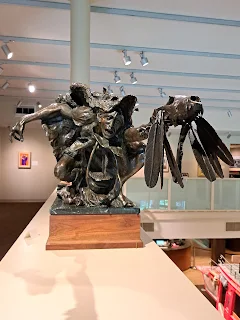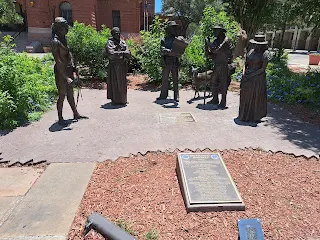 |
Silk: Caroline's Story;Tapestry: A Lowcountry Rapunzel; and Homespun.
My Blog:
Tuesday, October 24, 2023
Language Studies for Travel & My Writing Research
Wednesday, October 18, 2023
'Meditations' by Marcus Aurelius: Two Millenia Old, yet Relatable
 |
| Author Sophia Alexander with her e-book of Meditations by Marcus Aurelius |
His thoughts on being a better person—and coping—are presented in a somewhat different structure and light than I’m used to. The meditations begin by summarizing positive lessons he’s learned from a variety of specific individuals in his life. One man took friendship to a higher level when he showed that he would “not just shrug off a friend’s resentment—even unjustified resentment—but try to put things right.” I’m impressed at how much Marcus encourages patience, even saying, “no one does the wrong thing deliberately.” My wheels start churning a little when he points out that our priority is to protect the spirit from anything that might lead it astray, adding that the “applause of the crowd, high office, wealth, and self-indulgence… might seem to be compatible… for a while. But suddenly they control us and sweep us away.” Certainly a slippery slope, anyhow.
I'm also impressed when he says to “be attentive to the
power inside you and worship it sincerely.”
Yes, he refers to the ‘gods’, as he lives in the time of the Roman
pantheon, but I hadn’t thought he’d entertain a concept like this,
which reminds me of what I’ve understood the Hindu term namaste to mean:
‘the light in me sees the light in you’.
Maybe an awareness of one’s own divinity was more common in polytheistic
cultures?
He begins his ‘Book 4’ (the ‘books’ are more like chapters
here) with a motivational talk: “Our inward power, when it obeys nature, reacts
to events by accommodating itself to what it faces… it turns obstacles into
fuel… What’s thrown on top of the conflagration is absorbed, consumed by it—and
makes it burn still higher.” Just a
little thrill-read there!
I get a more general thrill at contemplating that I’m reading
the inner thoughts of a man—a Roman emperor, no less—from nearly two millenia
ago, mostly because they so often resonate with my own--almost like feelings are universal and always have been, hmm?
All that said, some of his philosophizing
creates moral loopholes for his conduct. He tells himself to dissociate his spirit from what his body parts do, which perhaps comes across as worse than it is, though it's hard to know when he's not specific and is continually chiding himself for lustfulness. A sort of belief in predestination (maybe a ‘Not my fault, even if it’s
my hand!’ concept) could assuage any guilt he has about ordering executions and
such in his role in the government. He
says at one point: “Three days of life or three generations: what’s the
difference?” To be fair, he does precede
this with some insightful conversation about our
transience: “For you can’t lose either the past or the future; how could you
lose what you don’t have?” He talks about how we become part of nature again, about
how the only time we have is ‘now’: the past is gone, and the future is just a
concept, and ‘a brief instant is all that is lost’ at death, which is “nothing
but the dissolution of the elements from which each living thing is composed…
something like birth, a natural mystery, elements that split and recombine… [Y]ou
will vanish into what produced you. Or be restored, rather. To the logos from
which all things spring, by being changed”. Perhaps he isn’t entirely wrong in
his assertion that you’re only losing the present. However, some postulate that time is just a
dimension, that we aren’t so separated from the past and the future as all that,
so I’m not buying it entirely. But it's
a comforting thought, in a way—especially in coping with loss.
At one point, Marcus even says that whatever happens is “for the best. So nature had no choice but to do it.” I was stunned at hearing this, as it’s mirrored in the Pollyanna philosophy of a 17th-century polymath, Gottfried Wilhelm Leibniz, on why God lets bad things happen—a sort of ‘least of all ills’ concept of things, though here Leibniz’s ‘God’ is Marcus’s ‘Nature’, something Leibniz dared not say, after what happened to his contemporary Baruch Spinoza—who did equate God with Nature, only to be excommunicated and likely murdered for it. Hmm, perhaps Leibniz read Marcus Aurelius’s Meditations at a certain point, absorbing it like a sponge, just as he absorbed Isaac Newton’s Calculus concepts! (He'd seen some of Newton's early mathematical papers related to this subject, but they’re both credited with inventing Calculus on their own, the f(x) functions and the integral sign ∫ being Leibniz’s version whereas Newton used dot notation.) I’d blown off Leibniz’s 'All Is for the Best' philosophy when I was first introduced to it, thinking it merely a self-protective effort to prove that his philosophies were Christian and not at all heretical, but Marcus, too, has “a resolve to accept whatever happens as necessary and familiar.” The Roman emperor even refers to the world as “a living being—one nature, one soul.” Luckily for Marcus Aurelius, he was the emperor and didn't have to worry so much about being persecuted by the authorities.
It's interesting that I cast off Leibniz's 'least of all ills' philosopy despite having been fascinated as a girl by a Hans Christian Andersen tale, "The Story of a Mother", in which a woman is heartbroken about the death of her darling child, only to be given foresight of the cruel future that would have otherwise awaited the child. I dwelled on that concept of 'God knows best', very similar to this one, after reading it, and that story truly is the second most memorable of all those I read in my volume of The Complete Works of Hans Christian Andersen (superceded only by "The Matchstick Girl"). Perhaps that oft-depressed author had been influenced by the philosophies of Leibniz and/or Marcus Aurelius, in one way or another.
Having managed to entirely bypass philosophy in school, I only heard about Meditations from the Daily Stoic, Ryan Holiday, who recommended Gregory Hays' translation as the best. Ryan sells a leatherbound version, but I was able to instantly download it for free to my Nook. Ryan's online videos on Stoicism can be inspiring to listen to, and often he speaks with wonderful zeal, though I've laughed at his sometimes morbid, over-the-top 'You will die!' reminders. He's fond of pointing out that Marcus speaks from experience about grief, that he’d suffered in the death of several of his children—no doubt true, but let me interject that I doubt this busy emperor felt the loss of his children as keenly as the woman who birthed them. Marcus only describes his wife as “obedient, loving, humble,” yet I doubt any loving mother could truly agree with, “Three days of life or three generations: what’s the difference?” But maybe I’m projecting. I can't fathom being Stoic or expecting Stoicism in that situation.
Marcus sometimes sinks into depression, or rather jumps in head-first. He wants to be detached from even things like music, anything that perks his interest, idealizing being ‘disinterested’ and saying that the way to do it is to analyze it to death, basically. When he’s stressed out and bringing up death constantly, it’s not always in order to put bad things in perspective. Sometimes, yes. But often it very much sounds like, “What a relief it would be to just die…” Just sayin’. But this wasn’t meant for publication, to my understanding. He may have struck some of that if he’d known where it would wind up.
Another critique is that for all his ideas of 'oneness', he certainly thinks about society as a caste system. Convenient for the emperor, hmm? I’m sure it helped keep order, at a basic level. Or at least in their existing empire, it did. But how easy to spout stuff like that when you’re the one on the apex. Not that it really makes him happy. He's a bit depressed, I’m sure of it. Are power-mad people truly happy? I suspect he's less power-mad than most emperors, but he certainly has his share of it. He keeps talking about setting people straight in their mistaken ways, and his tone there strikes me--and probably them--as a bit obnoxious. Yet he's not oblivious to this, saying many people will undoubtedly be relieved when he dies, tired of being judged by him! Poor fellow. He's doing his best.
Oh, but he strives to be so serious. I do get where it’s not always appropriate to be joking, that some gravitas is a good thing. But in his case, he needs a good laugh a bit more often…
While I did not find much humor overall in these Meditations, I’ll leave you (hopefully not literally, not yet) with this quote: “Don’t let yourself
forget how many doctors have died after furrowing their brows over how many
deathbeds. How many astrologers, after pompous forecasts about others’ ends.
How many philosophers, after endless disquisitions on death and immortality…”
Wednesday, October 11, 2023
'Homespun' Vying for Laramie Award by Chanticleer International
Here's the link for the longlist:
https://www.chantireviews.com/2023/10/09/the-2023-laramie-book-awards-long-list-for-americana-fiction/?utm_source=rss&utm_medium=rss&utm_campaign=the-2023-laramie-book-awards-long-list-for-americana-fiction&mc_cid=1755091776&mc_eid=59ee6074f9
Tuesday, October 3, 2023
My Yucatan Read: 'The Daughter of Doctor Moreau' by Silvia Moreno-Garcia
The story switches perspectives between Carlota and
Montgomery, the flawed overseer of the estate.
His rough-and-ready, jaded viewpoint drew me in, reminiscent of an old
Western, not that I have read many of those!
It worked well here, though, a rather unique combination that
Moreno-Garcia has created for us. I kept
imagining a somewhat-younger Daniel Craig in his role. As hopeless as Montgomery is about life, and
for all his bad habits, he has my respect by the end.
I don’t want to say too much about the plot, as the author
works in surprises from the beginning. She actually did manage to ‘catch’ me
with them early on—whereas I guessed the big twist at the end of the novel 😉. However, this story took more work than her
other novels to get into—as she brings up loads of character names without
preamble, treating it all like a mystery, as if she’s dropping clues for you to
figure out, but it’s disconcerting at first.
Stick with it, though, and you’ll be glad you did (if you’re anything
like me).
While Moreno-Garcia’s story is not focused overly much on
the historical surroundings, she did help me to understand about the Mayan
uprisings of the time (the novel begins in 1871), of the caste issues of the
region, etc. One reviewer calls
Moreno-Garcia a ‘virtuoso of the anti-imperialist gothic novel’, to which I nod
in agreement, though I should add that so far there is always, at some point, a rather grotesque element to her stories. This Mexican-Canadian
author already ranks among my favorites, and this book is worthy of
accompanying her other novels on my bookshelf or e-reader, as the case may be.
Monday, October 2, 2023
'Homespun' Awarded American Fiction Award Medallion
Yay! Homespun has been awarded a 2023 finalist medallion for the American Fiction Awards in the category of Family Saga, following in the footsteps of Silk: Caroline's Story.
Monday, July 10, 2023
Silk Review in Tybee Beachcomber
I loved it and I can’t wait to read Tapestry, the next book in the series. I need to know what happens next to all these characters!
https://tybeebeachcomber.com/mt-content/uploads/2023/07/tb-july-2023-lyt.pdf
Think I'll check and see if she wants me to send her Tapestry, right?
Monday, June 26, 2023
Historical Novel Society Conference 2023 in San Antonio
HNS 2023 was busy with sessions from dawn to dusk. I was so absorbed with greeting old writing friends and meeting new ones that I only took these pictures on June 10th (the day of the book festival) and 11th (actually my birthday, the day after the conference, when I visited the Briscoe Western Art Museum before flying home). I did get to take a riverboat cruise and go on an HNS tour of the Alamo, too, but I was too busy listening to the tour and then chatting with my fellow authors to bother with pictures. I still have close to 80 hours of recorded classes (so many going on at once) to listen to in the next couple of months, sometime, somehow! BTW, I've always considered Savannah about as hot as it gets, but nope--San Antonio was scorchin'! Also... the museum confirmed that Texas is the West, not the South :). They had a whole display of 'What does the West mean for you?'

.jpg)















